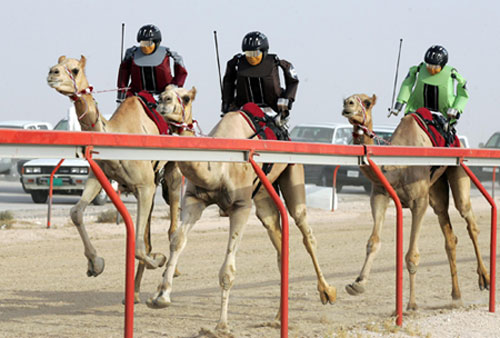Skip to comments.
Camel race with robot jockeys (WHAT???)
Herald Sun ^
| 6 February 2006
Posted on 02/05/2006 3:50:16 PM PST by Aussie Dasher
KUWAIT today held the first regional camel race using robots as riders after child jockeys were banned from the lucrative sport following criticism by human rights groups.
Teams from the six Gulf Arab states participated in the race held on the dusty tracks of a racing club outside the capital Kuwait City.
"We hope this sport, which is part of our cultural heritage, will be spared from suspicion,"said Kuwait's Energy Minister Sheikh Ahmad al-Fahd al-Sabah who opened the five-day championship.
The remote-operated robots are shaped like small boys.
Rights groups said thousands of boys, some as young as four, worked as jockeys in the wealthy Gulf Arab region where camel racing is a lucrative and popular sport. Last year, Kuwait, Qatar and the United Arab Emirates banned child jockeys.
Kuwait held an experimental race with robot jockeys last October, along with similar trials by other Gulf states.
TOPICS: Pets/Animals; Society; Weird Stuff
KEYWORDS: camelraces; camels; jockeys; kuwait; mrroboto; robots
Got to admit, it's different!!!
To: Aussie Dasher
The remote-operated robots are shaped like small boys.
Sevalr Arabs were injured in the groin then they attempted to hump the robots.
2
posted on
02/05/2006 3:57:22 PM PST
by
isthisnickcool
(Quoting Hillary Clinton: "You know, you know, you know, you know.....")
To: Aussie Dasher
Robot camel-jockeys take to the track
- 18:18 21 July 2005
- NewScientist.com news service
- Will Knight

The camel-riding robots are controlled remotely (Image: Reuters / Fadi Al-Assaad)
A camel race with robotic riders took place on Monday in the United Arab Emirates, marking the start of a curious new Middle Eastern sporting event.
Ten robot riders took part in the inaugural race. They were pursued around the Al Wathba racing track in Abu Dubai by human operators carrying handheld radio units, in a convoy of sports utility vehicles.
Desert racing has a long history among Bedouin Arabs and remains a popular and lucrative spectator sport. But the use of child jockeys has been condemned by human rights activists, who allege that jockeys - as young as four years of age - have in the past been kidnapped, kept in prison-like conditions and deliberately underfed for racing.
The robots were developed after the United Arab Emirates Camel Racing Association banned the use of jockeys under the age of 16 in March 2004. The age limit for jockeys was increased to 18 in July 2005.
“Indispensable sport”
The robot race was attended by UAE minister for presidential affairs, Sheikh Mansour bin Zayed Al Nahyan, who described it as a "tremendous success", adding that, "the coming phase will witness a new development in this indispensable sport in the UAE".
An unnamed Swiss company has reportedly been paid $1.3m to develop the robotic jockeys, which are sold for around $5500 each. The first trials involving the riders took place in April 2005.
The remote-controlled riders have mechanical legs for balancing or leaning and mechanical arms for pulling on their camel's reins.
Robert Richardson, a robotics expert at the University of Manchester, UK, says the design may be simple, but it could still have problems. "When you're connecting a robotic system to an animal, or a human, you have to be careful," he told New Scientist. He adds that a completely autonomous design could be even more hazardous.
Camel races are held at purpose-built tracks during the UAE’s winter months, between October and April. A racing festival is held in Al Wathba each year and attracts entrants from around the world.
3
posted on
02/05/2006 3:57:46 PM PST
by
csvset
To: Aussie Dasher
4
posted on
02/05/2006 4:02:14 PM PST
by
csvset
To: csvset
So what's wrong with using adult riders? Too sporting perhaps?
5
posted on
02/05/2006 4:50:02 PM PST
by
Americanchild
(..and deliver us all from Islam! Amen!)
To: Americanchild
They tried that, but the jockeys kept mounting the camels wrong.
6
posted on
02/05/2006 4:56:46 PM PST
by
Ronin
(When the fox gnaws.... SMILE!!!)
To: Aussie Dasher
To: Ronin
They tried that, but the jockeys kept mounting the camels wrong.Bad Freeeper!
But seriously--a camel is a big animal fully capable of running around with a full size human aboard. What's with this history of little boys as jockeys? Was it just an excuse to keep little boys around for other purposes?
8
posted on
02/05/2006 6:12:46 PM PST
by
Americanchild
(..and deliver us all from Islam! Amen!)
To: Americanchild
I am assuming it's because the boys, weighing less, let the camels run faster -- but it might be the other reason too.
9
posted on
02/05/2006 6:56:09 PM PST
by
Ronin
(When the fox gnaws.... SMILE!!!)
Disclaimer:
Opinions posted on Free Republic are those of the individual
posters and do not necessarily represent the opinion of Free Republic or its
management. All materials posted herein are protected by copyright law and the
exemption for fair use of copyrighted works.
FreeRepublic.com is powered by software copyright 2000-2008 John Robinson


